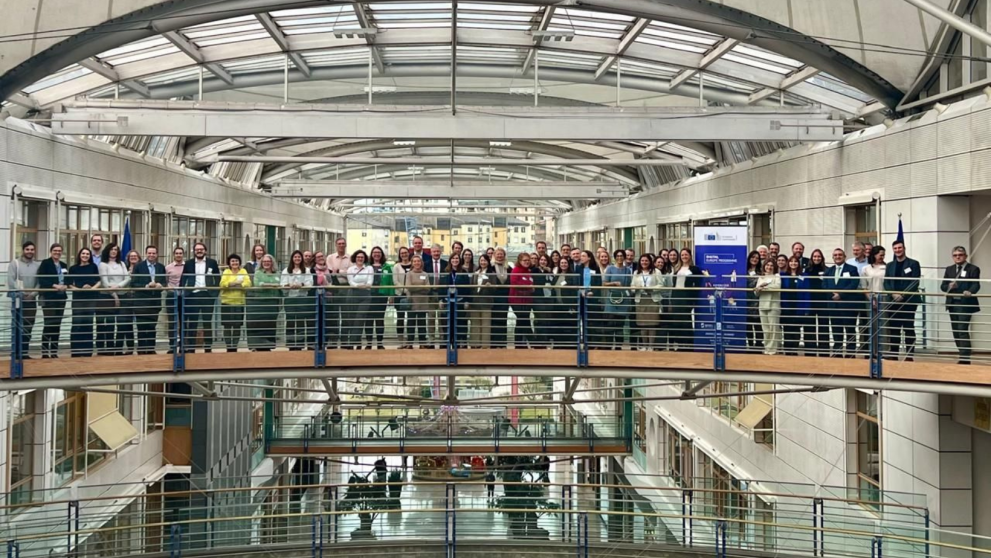Collaboration, innovation, and skills: Building Europe’s Digital Workforce by 2030

Luxembourg 17-18 March 2025 - The Digital Skills and Jobs Platform took a train to join the event organised by LEADSx2030 project and the DIGITAL Programme. A significant two-day event in Luxembourg, focusing on shaping the future of Advanced Digital Skills (ADS) across Europe. This meeting, brought together leaders, policymakers, and stakeholders from various projects funded by the Digital Europe Programme (DEP) to discuss the future of digital skills and how to enhance Europe’s competitiveness and resilience through education and training in core digital fields.
The event featured in-depth discussions on the Digital Decade objectives, which aim to employ 20 million ICT specialists in Europe by 2030. Central to the dialogue were the Digital Skills Academies being launched in areas like Quantum, Artificial Intelligence, Virtual Worlds, and Semiconductors, designed to equip Europe’s workforce with the skills necessary to meet the demands of the digital future. Yvo Volman (Director, DG CNECT G, Data), Rehana Schwinninger-Ladak (Head of Unit, DG CNECT G.2), and Anne Bajart (Deputy Head of Unit, DG CNECT G.2) set the tone by emphasising the importance of a coordinated approach to digital skills training, ensuring that workers are prepared for real-world demands.
“For DIGITAL we have set the 20 million ICT specialist in Europe, by 2030. And we are far away from that, with the Union of skills, we are making the move towards a coordinated approach, this means better alignment between training and the top part, also, ensuring that workers and earnings are equipped for real world demands. We have a vision, and we have a solid strategy in place, and we have the tools to make it happen.” -Yvo Volman, Director, DG CNECT G, Data.
State-of-play and future directions
A presentation led by Asja Satler (Programme Manager, DG CNECT G.2), Nadja Kernchen (Policy Officer, DG CNECT G.2), and Óscar Rodríguez (Project Adviser, HaDEA B.2) provided a comprehensive overview of the current state of digital skills in Europe and outlined future directions, focusing on the role of the Digital Skills and Jobs Platform in addressing the growing need for advanced digital skills.
“It is crucial to get the conversation started and then thinking about how we can all engage, how you can now engage in necessary stakeholders of the public and promoting programmes and trainings that have been developed. How can we ensure that the most successful programmes can be replicated in different Member States, or even the different universities?” - Nadja Kernchen, Policy Officer, DG CNECT G.2
A key presentation on Cybersecurity Skills Academy by Andrei Popescu (Policy Officer, DG CNECT H.1, Cybersecurity Technology and Capacity Building) and Ioannis Panolias (Senior Policy Officer, National Cybersecurity Authority, Greece) highlighted the urgent need for developing cybersecurity competencies to secure Europe’s digital future.
Sustainability, accreditation, and gender inclusion in digital skills development
Throughout the meeting, a recurring theme was collaboration—no project can succeed alone. The success of digital skills initiatives relies on cooperation between industry, academia, EU bodies, and regional authorities. Agility in governance and user-centric course design were also highlighted as vital factors for the success of the Digital Skills Academies. Additionally, attracting international talent and addressing the gender gap in digital skills were seen as essential for creating a diverse and future-ready workforce. The event also emphasised sustainability and accreditation as fundamental pillars for the long-term success of digital skills initiatives. Digital Skills Academies must be designed with sustainability in mind to ensure that their impact lasts beyond the initial phases of funding. The event further showcased the need for trusted data sharing to enable informed decision-making and innovation in digital education.
@ LEADSx2030





